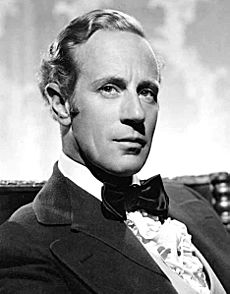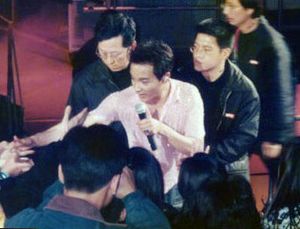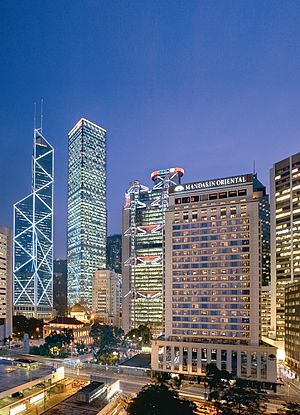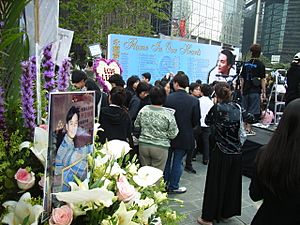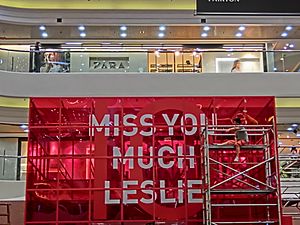Leslie Cheung facts for kids
Quick facts for kids
Leslie Cheung
|
|||||||||||||
|---|---|---|---|---|---|---|---|---|---|---|---|---|---|
| 張國榮 | |||||||||||||
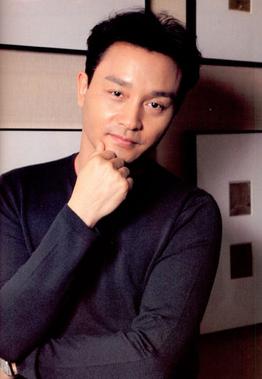
Leslie Cheung in 1999
|
|||||||||||||
| Pronunciation | Cheung Kwok-wing | ||||||||||||
| Born |
Cheung Fat-chung
12 September 1956 |
||||||||||||
| Died | 1 April 2003 (aged 46) Mandarin Oriental, Hong Kong
|
||||||||||||
| Resting place | Po Fook Hill, Sha Tin, New Territories | ||||||||||||
| Citizenship | |||||||||||||
| Alma mater | University of Leeds | ||||||||||||
| Occupation |
|
||||||||||||
| Years active | 1977–2003 | ||||||||||||
| Height | 1.74 m (5 ft 8+1⁄2 in) | ||||||||||||
| Partner(s) | Daffy Tong (1997-2003) | ||||||||||||
| Musical career | |||||||||||||
| Also known as | Elder Brother (Chinese: 哥哥) | ||||||||||||
| Genres | |||||||||||||
| Instruments | Vocals | ||||||||||||
| Labels | |||||||||||||
| Cheung Kwok-wing | |||||||||||||
| Traditional Chinese | 張國榮 | ||||||||||||
| Simplified Chinese | 张国荣 | ||||||||||||
| Jyutping | Zoeng1 Gwok3-wing4 | ||||||||||||
|
|||||||||||||
| Cheung Fat-chung | |||||||||||||
| Traditional Chinese | 張發宗 | ||||||||||||
| Simplified Chinese | 张发宗 | ||||||||||||
| Jyutping | Zoeng1 Faat3-zung1 | ||||||||||||
|
|||||||||||||
Leslie Cheung Kwok-wing (born 12 September 1956 – died 1 April 2003) was a famous singer and actor from Hong Kong. He had a long career of 26 years, from 1977 until his death. During this time, Cheung released over 40 music albums and acted in 56 films. He was a key figure in shaping Cantopop music in the 1980s. He was also known for his unique and bold stage presence. In the 1990s, his acting career grew, and he became recognized for his powerful performances in movies. His career was filled with both praise and discussions about his artistic style.
Contents
Early Life and Education
Leslie Cheung was born Cheung Fat-chung in Kowloon, British Hong Kong. He was the youngest of 10 children in his family. His father, Cheung Wut-hoi, was a well-known tailor who made suits for famous Western celebrities.
Cheung attended Rosaryhill School in Hong Kong. At age 12, he moved to England to study at Eccles Hall School. He was good at English and developed a love for Western films and music. While in England, he sometimes sang at his relatives' restaurant. He chose "Leslie" as his English name after seeing the actor Leslie Howard in the film Gone with the Wind. He liked that the name could be for a man or a woman.
Cheung later studied textile management at the University of Leeds. In 1976, he returned to Hong Kong because his father became ill. He stopped his studies and worked as a salesman for Levi's.
Music and Film Career
Starting Out
When he returned to Hong Kong, Cheung joined a band as the lead singer. In 1977, he entered the Asian Singing Contest and finished as the first runner-up in Hong Kong. After the contest, he signed a contract with Rediffusion Television (RTV) as an actor and with Polydor Records to release music.
His first few albums were not very successful. Critics even said his voice sounded "chicken-like." He described his early days as "full of uncertainty" and "despair."
Rise to Stardom (1982–1989)
In 1982, Cheung signed with Capital Artists. His song "The Wind Blows On" (1982) became a hit and helped him become a popular Cantopop singer. His album of the same name was certified gold. He also started acting in films, like Nomad (1982), where he played a troubled teenager. This role showed his talent as an actor.
In 1984, Cheung became a huge star with his hit song "Monica." This song was very popular and introduced a new upbeat dance style to Cantopop. His album, which included "Monica," sold over 200,000 copies. He also starred in successful TV dramas and films. As his fame grew, the media often compared him to another popular singer, Alan Tam. This friendly competition helped Cantopop become even more popular.
Cheung continued to release hit albums like For Your Heart Only (1985) and Summer Romance (1987). Summer Romance was the best-selling Cantopop album of 1987, selling over 350,000 copies. His song "Who Feels the Same?" (1986) won the top song award at the Jade Solid Gold Awards. He also starred in the action film A Better Tomorrow (1986), which was a big step in his acting career.
In 1988, Cheung held a very successful concert tour in Hong Kong and North America. In 1989, he announced his "retirement" from music and moved to Vancouver, Canada. Before leaving, he released more successful albums and won "Most Popular Male Artist" awards. He also donated profits from his 1989 album Salute to the Hong Kong Academy for Performing Arts.
Focus on Films (1990–1995)
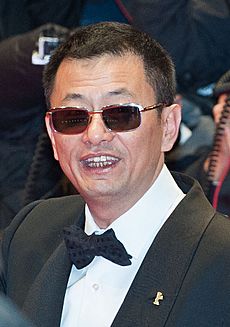
Even though he "retired" from singing, Cheung continued his acting career. His role in Wong Kar-wai's Days of Being Wild (1990) won him the Hong Kong Film Award for Best Actor in 1991. He also starred in other popular films like A Chinese Ghost Story (1987) and Rouge (1987). His performances with co-star Anita Mui were highly praised.
Cheung also wrote more than ten songs during this time. In 1993, he won an award for "Best Original Movie Song" for "Red Cheek, White Hair" from the film The Bride with White Hair.
Return to Music (1995–1999)
In 1995, Leslie Cheung returned to music and signed with Rock Records. His first album after his "retirement," Beloved, was a big success and won the "IFPI Best Selling Album" award.
His 1996 album Red was known for its experimental sounds and bold visual style. In 1999, he received the Golden Needle Award, which is the highest honor at the RTHK Top 10 Gold Songs Awards. In 2000, he was named "Asia's Biggest Superstar" at the CCTV/MTV Music Honours in mainland China.
Later Years (2000–2003)
Cheung's last concert tour was the Passion Tour from 2000 to 2001. He worked with fashion designer Jean Paul Gaultier to create unique costumes for the show. The tour was praised in Japan, Korea, and Canada for its glamour and bold performances. Although his later albums did not sell as many copies as his earlier ones, the Passion Tour broke attendance records in Asia. In 2011, CCTV called the "Passion Tour" the highest standard for Chinese concerts.
Personal Life and Philanthropy
Leslie Cheung had a few relationships during his early career. He was good friends with actress Teresa Mo, whom he met in 1977. He also had a brief relationship with actress Shirley Yim and model Ngai Sze-pui.
Cheung moved to Vancouver in 1990 and became a Canadian citizen.
He was a strong supporter of charities, especially those helping children with cancer. In 1996, he donated HK$1 million (about US$128,000) to the Children's Cancer Foundation. He also launched special "RED cards" to help raise more funds. He was the first Cantopop star to organize a charity fundraiser at a concert.
In 1999, he donated HK$250,000 at a charity event for Taiwan earthquake relief. He also donated personal items, like his badminton racket, to be auctioned for charity. In 2003, he asked his party guests to give him cash instead of presents, and he donated all the money to the Seedling protection fund.
Legacy
Leslie Cheung passed away on 1 April 2003. His death saddened millions of fans across Asia and shocked the entertainment industry worldwide. His partner, Daffy Tong, later confirmed that Cheung had been struggling with depression. He was buried in Po Fook Hill, Shatin.
Despite the health concerns at the time, thousands of fans attended his memorial service on 7 April 2003. His funeral was held on 8 April 2003. For almost a month, his death was a major topic in Hong Kong newspapers, and his songs were played constantly. His final album, Everything Follows the Wind, was released three months after his death.
In 2013, to mark the 10th anniversary of his passing, his former music agent organized two memorial concerts called Miss You Much Leslie. Many famous Hong Kong entertainers performed at these concerts. Fans from around the world also made two million orizuru (paper cranes) as a tribute, setting a Guinness World Record.
On what would have been his 60th birthday, 12 September 2016, over a thousand fans gathered for prayers. His fan club, Red Mission, organized a "Leslie Cheung 60th Red Hot Birthday Party" with videos and songs. Another fan club, United Leslie, held an exhibition and movie screenings.
On 1 April 2022, a remastered 4K version of Leslie Cheung's Passion Tour concert was released online. This was done to mark the 19th anniversary of his passing.
Leslie Cheung was known for his unique roles in films and his bold fashion choices, like wearing red high heels in a performance. He faced discussions about his artistic expression.
In 2018, an asteroid was named 55383 Cheungkwokwing in his memory. It was discovered in 2003.
Awards and Nominations
RTHK Top 10 Gold Songs Awards
| Year | Category | Recipient | Result |
|---|---|---|---|
| 1984 | Top 10 Gold Songs | "Monica" | Won |
| 1985 | "Wild Wind" (不羈的風) | Won | |
| 1986 | "Past Love" (當年情) | Won | |
| 1987 | "Sleepless Night" (無心睡眠) | Won | |
| Best CD | Summer Romance | Won | |
| Sales Award (Best-Selling Album of the Year) | Won | ||
| 1988 | Top 10 Gold Songs | "Silence is Golden" (沉默是金) | Won |
| "Don’t Need Too Much" (無需要太多) | Won | ||
| IFPI Award | Leslie Cheung (張國榮) | Won | |
| 1999 | Top 10 Gold Songs | "Left Right Hand" (左右手) | Won |
| Golden Needle Award (金針獎) | Leslie Cheung (張國榮) | Won | |
| 2000 | Top 10 Gold Songs | "Big Heat" (大熱) | Won |
| 2002 | Silver Jubilee Award | Leslie Cheung (張國榮) | Won |
Jade Solid Gold Best Ten Music Awards
| Year | Category | Recipient | Result |
|---|---|---|---|
| 1983 | Top 10 Gold Songs | "Wind Blows On" (風繼續吹) | Nominated |
| 1984 | "Monica" | Won | |
| 1985 | "Wild Wind" (不羈的風) | Won | |
| 1986 | "Past Love" (當年情) | Won | |
| "Who Resonates With Me" (有誰共鳴) | Won | ||
| Gold Song Gold Award (金曲金獎) | Won | ||
| 1987 | Top 10 Gold Songs | "Sleepless Night" (無心睡眠) | Won |
| Gold Song Gold Award (金曲金獎) | Won | ||
| 1988 | Top 10 Gold Songs | "Silence is Golden"(沉默是金) | Won |
| "Closer" (贴身) | Won | ||
| Most Popular Male Artist (最受歡迎男歌星) | Leslie Cheung (張國榮) | Won | |
| 1989 | Top 10 Gold Songs | "Starting from Zero" (由零開始) | Won |
| Most Popular Male Artist (最受歡迎男歌星) | Leslie Cheung (張國榮) | Won | |
| 1999 | Honours Award (榮譽大獎) | Won | |
| 2000 | Four Channel Award (Best Album of the Year) | Untitled | Won |
| Honours Award (榮譽大獎) | Leslie Cheung (張國榮) | Won |
Other Music Awards
| Year | Award | Category | Recipient | Result |
|---|---|---|---|---|
| 1988 | Ultimate Song Chart Awards | Ultimate Male Artist Gold Award | Leslie Cheung (張國榮) | Won |
| 1989 | Won | |||
| IFPI Award | Side Face (側面) | Won | ||
| 1999 | Ultimate Song Award (No. 1 Song of the Year) | "Left Right Hand"(左右手) | Won | |
| Metro Radio Hit Music Awards | Metro Radio Hit Song of the Year | Won | ||
| Metro Radio Top 10 Hit Songs | Won | |||
| 2000 | CCTV-MTV Music Honours | Asia's Biggest Superstar | Leslie Cheung (張國榮) | Won |
| 2001 | Chinese Pop Music Media Awards | Best Male Singer | Won |
Hong Kong Film Awards
| Year | Category | Film | Result |
|---|---|---|---|
| 1983 | Best Actor | Nomad (烈火青春) | Nominated |
| 1988 | A Better Tomorrow 2 (英雄本色2) | Nominated | |
| Best Original Film Song | A Chinese Ghost Story (倩女幽魂) | Nominated | |
| 1989 | Best Actor | Rouge (胭脂扣) | Nominated |
| 1991 | Days of Being Wild (阿飛正傳) | Won | |
| 1994 | Best Original Film Song | The Bride With White Hair (白髮魔女傳) | Nominated |
| 1995 | Best Actor | He's a Woman, She's a Man (金枝玉葉) | Nominated |
| Best Original Film Song | Won | ||
| 1996 | The Phantom Lover (夜半歌聲) | Nominated | |
| 1997 | Best Original Film Song | Who's the Woman, Who's the Man? (金枝玉葉2) | Nominated |
| 1998 | Best Actor | Happy Together (春光乍洩) | Nominated |
| 2003 | Inner Senses (異度空間) | Nominated |
Golden Horse Awards
| Year | Category | Film | Result |
|---|---|---|---|
| 1991 | Best Leading Actor | Days of Being Wild (阿飛正傳) | Nominated |
| 1993 | Best Original Song | The Bride With White Hair (白髮魔女傳) | Won |
| 1994 | He's a Woman, She's a Man (金枝玉葉) | Nominated | |
| 1995 | The Phantom Lover (夜半歌聲) | Nominated | |
| 1996 | Best Leading Actor | Temptress Moon (風月) | Nominated |
| Best Original Song | Nominated | ||
| Who's the Woman, Who's the Man? (金枝玉葉2) | Nominated | ||
| 1997 | Best Leading Actor | Happy Together (春光乍洩) | Nominated |
| 2000 | Double Tap (鎗王) | Nominated | |
| 2002 | Inner Senses (異度空間) | Nominated |
Other Film Awards
| Year | Award | Category | Film | Result |
|---|---|---|---|---|
| 1991 | Asia Pacific Film Festival | Best Actor | Days of Being Wild (阿飛正傳) | Nominated |
| 1993 | Cannes Film Festival | Best Actor | Farewell My Concubine (霸王別姬) | Nominated |
| 1994 | Hong Kong Film Critics Society Awards | Best Actor | Ashes of Time (東邪西毒) | Won |
| Japan Film Critics Society | Farewell My Concubine | Won | ||
| Venice Film Festival | Best Actor | Ashes of Time | Nominated | |
| 1996 | Cannes Film Festival | Best Actor | Temptress Moon (風月) | Nominated |
| 1997 | Cannes Film Festival | Best Actor | Happy Together (春光乍洩) | Nominated |
Ming Pao Power Academy Awards
| Year | Category | Recipient | Result |
|---|---|---|---|
| 2000 | Honorary Award | Leslie Cheung (張國榮) | Won |
| Outstanding Male Singer | Won | ||
| 2002 | Best Actor | Inner Senses (異度空間) | Won |
Discography
Filmography
See also
 In Spanish: Leslie Cheung para niños
In Spanish: Leslie Cheung para niños
- Cinema of Hong Kong
- Music of Hong Kong
Images for kids


